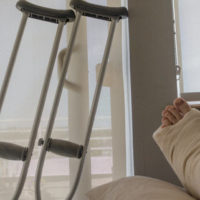How Visitor Classification Impacts Premises Liability

Today we will explore an important component of personal injury law – how different kinds of visitors impacts premises liability. As a reminder, premises liability is a legal doctrine that governs how property owners deal with people who visit the property.
As the Court of Appeals of Maryland outlined in the landmark case Baltimore Gas and Electric Company v. Flippo, there are essentially four types of visitors – invitee, licensee, bare licensee and trespasser. As we will explore in the following sections, the property owner’s duties change based on the type of visitor.
What is an Invitee?
An invitee is a person who has an implicit invitation to visit the property. This is most common with business matters. If the business is open to the public, then any member of the public who visits the store is an invitee. Alternatively, any person who visits the premises to conduct business is also an invitee.
Property owners owe invitees the highest duty of care. Property owners must use “reasonable and ordinary care” to maintain safe premises and protect the invitee from harm. Additionally, property owners must warn invitees of any existing dangers on the property that are not easy to discover.
What is a Licensee?
A licensee is a guest invited to the premises by the property owner. The most common example here would be friends or family members of the property owner who visit the premises.
Property owners owe licensees a high duty of care, but not quite as high as for invitees. The standard for dealing with licensees is “reasonable care.” As with invitees, property owners must warn licensees of any existing dangers on the property that are not easy to discover.
What is a Bare Licensee?
A bare licensee is little different from the previous two classifications, as there is not an invitation per se. A bare licensee has permission from the property owner to be on the premises. But the bare licensee is only on the property for their own personal ends.
Property owners do not owe bare licensees a specific duty of care. But property owners cannot engage in “willful or wanton misconduct” that may result in harm to the bare licensee. Property owners must also warn bare licensees of any dangers on the property, new or existing.
What is a Trespasser?
A trespasser enters the property intentionally without the owner’s permission. The most common example here would be a thief who breaks into a property with the intent to rob the owner.
A property owner does not owe a duty of care to trespassers. But property owners cannot engage in “willful or wanton misconduct” that may result in harm to the trespasser. For example, property owners cannot set traps in their home or on their property for the purpose of ensnaring trespassers.
Let Us Help You with Your Case
If you have legal questions about premises liability, negligent security or other aspects of personal injury law, it is advisable to seek assistance from an experienced personal injury attorney.
Based in Baltimore, Maryland, Iamele & Iamele, LLP has established credentials in the field of personal injury law, including premises liability and negligent security. Please do not hesitate to contact us at your earliest convenience for a free initial consultation.

